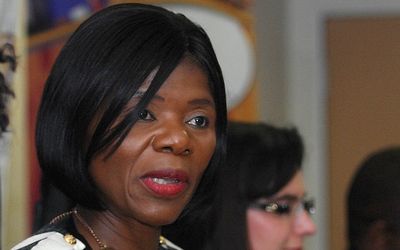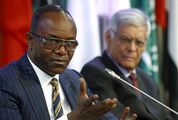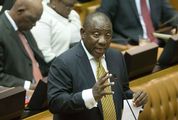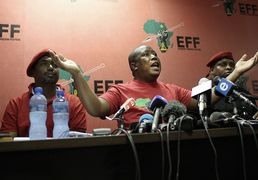"WE’LL see you in court!" Economic Freedom Fighters (EFF) leader Julius Malema declared in August last year.
This was after a year-long battle in Parliament during which the party took centre stage in the push to force President Jacob Zuma to "pay back the money" allegedly spent on undue benefits he and his family accrued in the upgrades to his Nkandla residence.
After another gruelling question-and-answer session with the president in Parliament, the party had been unsuccessful in its attempt to compel Mr Zuma to say when he would repay the money.
"It’s very clear we won’t get a clear answer from the president; we’ll see you in court," Mr Malema said at the time.
Apparently nothing has changed, even after Mr Zuma on Tuesday offered a "settlement proposal" in which he agreed to pay back some money, albeit an amount he suggested should be determined by the auditor-general and the minister of finance.
Mr Malema is due to brief the media on Thursday on the way forward following Mr Zuma’s proposal.
Sources close to the process confirmed on Thursday that the EFF would go ahead with the Constitutional Court case, which is due to start on Tuesday next week.
After initially scoffing at the EFF’s direct approach to the Constitutional Court, the Democratic Alliance (DA) joined the application. It, too, is determined to push on, despite Mr Zuma’s sudden about-turn on the matter.
Before it joined the EFF, the DA had initially approached the High Court in the Western Cape to rule on the matter.
Party leader Mmusi Maimane said on Wednesday the DA would not back down on its challenge after having sought legal advice on Mr Zuma’s surprise announcement.
Despite protestations to the contrary, the Nkandla issue affected the 2014 electoral campaign of the African National Congress, particularly in Gauteng. Support for the party in the largely urban province slipped to 54% in 2014 from 64% in 2009.
The EFF and the DA benefited in the province, with the new party obtaining 10% of the vote and the official opposition swelling its support from 22% in 2009 to 31%. Proceeding with the case in an election year can only benefit both parties.
The opposition parties charge that the case is about more than Nkandla and Mr Zuma, saying it cuts to the heart of the powers of the public protector’s office.
Mr Maimane said on Wednesday legal certainty on the powers of the public protector and the "force and the effect of the remedial action" taken by her were "vital to the successful functioning of our constitutional democracy".
Public protector Thuli Madonsela, who joined the case as a friend of the court, said on Wednesday she and her legal team were considering matters arising from the president’s proposal. She said she would not comment publicly out of respect for the Constitutional Court. When she was ready to respond formally, she would announce her decision publicly.
Opposition parties are far from deterred. They have caught the scent of blood and are chasing it.

ONWARD: Public protector Thuli Madonsela joined the case as a friend of the court, and said on Wednesday she and her legal team were considering matters arising from President Jacob Zuma’s proposal. Picture: TREVOR SAMSON
"WE’LL see you in court!" Economic Freedom Fighters (EFF) leader Julius Malema declared in August last year.
This was after a year-long battle in Parliament during which the party took centre stage in the push to force President Jacob Zuma to "pay back the money" allegedly spent on undue benefits he and his family accrued in the upgrades to his Nkandla residence.
After another gruelling question-and-answer session with the president in Parliament, the party had been unsuccessful in its attempt to compel Mr Zuma to say when he would repay the money.
"It’s very clear we won’t get a clear answer from the president; we’ll see you in court," Mr Malema said at the time.
Apparently nothing has changed, even after Mr Zuma on Tuesday offered a "settlement proposal" in which he agreed to pay back some money, albeit an amount he suggested should be determined by the auditor-general and the minister of finance.
Mr Malema is due to brief the media on Thursday on the way forward following Mr Zuma’s proposal.
Sources close to the process confirmed on Thursday that the EFF would go ahead with the Constitutional Court case, which is due to start on Tuesday next week.
After initially scoffing at the EFF’s direct approach to the Constitutional Court, the Democratic Alliance (DA) joined the application. It, too, is determined to push on, despite Mr Zuma’s sudden about-turn on the matter.
Before it joined the EFF, the DA had initially approached the High Court in the Western Cape to rule on the matter.
Party leader Mmusi Maimane said on Wednesday the DA would not back down on its challenge after having sought legal advice on Mr Zuma’s surprise announcement.
Despite protestations to the contrary, the Nkandla issue affected the 2014 electoral campaign of the African National Congress, particularly in Gauteng. Support for the party in the largely urban province slipped to 54% in 2014 from 64% in 2009.
The EFF and the DA benefited in the province, with the new party obtaining 10% of the vote and the official opposition swelling its support from 22% in 2009 to 31%. Proceeding with the case in an election year can only benefit both parties.
The opposition parties charge that the case is about more than Nkandla and Mr Zuma, saying it cuts to the heart of the powers of the public protector’s office.
Mr Maimane said on Wednesday legal certainty on the powers of the public protector and the "force and the effect of the remedial action" taken by her were "vital to the successful functioning of our constitutional democracy".
Public protector Thuli Madonsela, who joined the case as a friend of the court, said on Wednesday she and her legal team were considering matters arising from the president’s proposal. She said she would not comment publicly out of respect for the Constitutional Court. When she was ready to respond formally, she would announce her decision publicly.
Opposition parties are far from deterred. They have caught the scent of blood and are chasing it.




























Change: 2.60%
Change: 2.92%
Change: 4.80%
Change: 2.21%
Change: 2.84%
Data supplied by Profile Data
Change: 2.04%
Change: 2.00%
Change: 2.60%
Change: 0.00%
Change: 1.95%
Data supplied by Profile Data
Change: -0.36%
Change: -0.94%
Change: -1.36%
Change: -1.51%
Change: -0.23%
Data supplied by Profile Data
Change: -2.38%
Change: -1.99%
Change: -2.73%
Change: -1.92%
Change: 0.75%
Data supplied by Profile Data